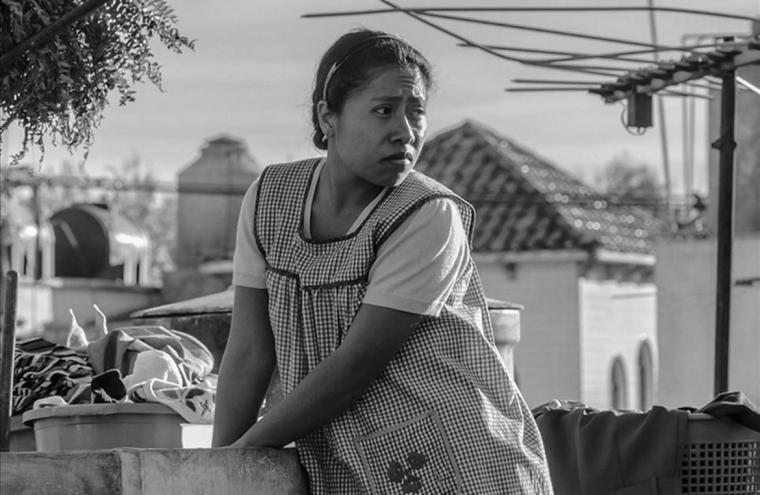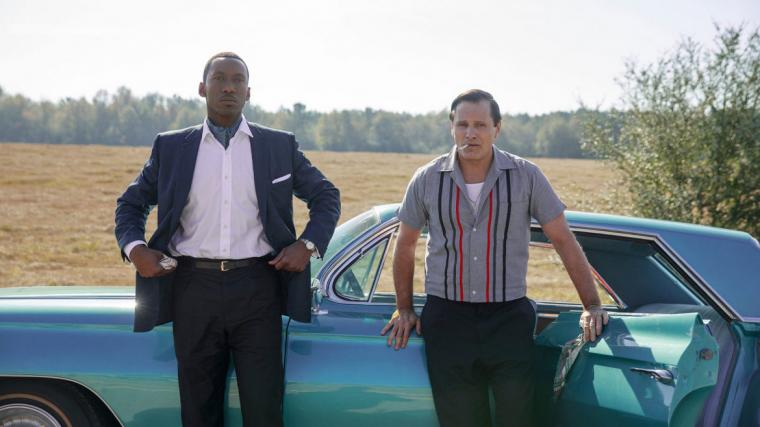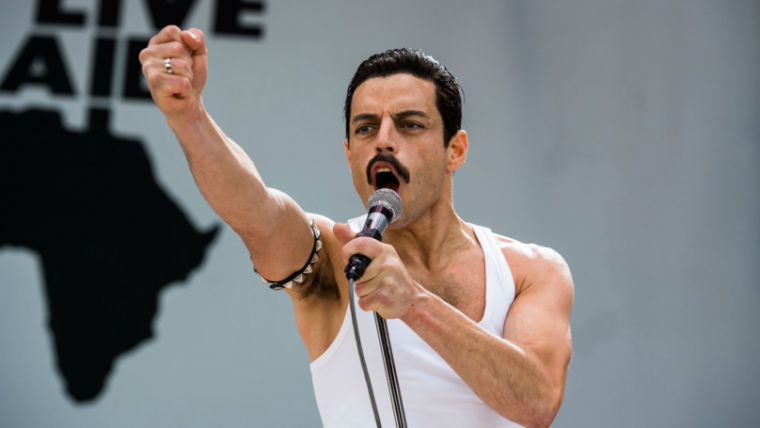
Among the front-runners for this year's Best Picture Oscar are a previous Academy Award winner's loving salute to his childhood nanny; a period bio-pic about revered music icons; a feel-good dramedy in the vein of Driving Miss Daisy; and Spike Lee's cinematic confrontation with the Ku Klux Klan that ends with searing indictments of the 2017 rally/riot in Charlottesville, Virginia, and, by extension, the president of the United States.
Guess which of these films, at present, is the least controversial.
That's right: the Spike Lee joint. Which is why I'm thinking that, when the Oscars are divvied up on February 24, BlacKkKlansman just might emerge as the shockeroo winner of the evening's biggest prize.
All of the traditional precursors leading up to the Academy Awards suggest that, as predictions go, this might be a pretty dumb one. Strike that – a really dumb one. Let's look at the stats from the last 10 years:
Eight winners of the Producers Guild of America Award went on to nab Best Picture; this year's victor was Green Book.
Seven winners of the Directors Guild of America Award found their movies named Best Picture; on February 2, that winning director was Alfonso Cuarón for Roma.
Six of the Best Film honorees at the British Academy of Film & Television Arts (BAFTA) Awards received the Oscars' across-the-pond equivalent; this year's champ was Roma.
Seven recipients of the Critics' Choice Movie Award eventually won the Oscar; Roma won this one, too. (Are we sending a trend?)
Half of the winners of the Screen Actors Guild Award for ensemble acting were eventual Best Pictures; this year, the SAG trophy went to Black Panther.
The Golden Globes, despite having the added benefit of handing out two Best Picture prizes (one for dramas, one for comedies and/or musicals), also boast 50-percent accuracy; last month, the victors were Bohemian Rhapsody and Green Book, with the ineligible Roma named Best Foreign Film.
Plus, with Best Picture equivalents having also been given out by more than 50 national and international critics' organizations, Roma is the clear leader overall with 25, followed by The Favourite with 10 (11 if you count its BAFTA for Best British Film), Green Book and If Beale Street Could Talk – the latter not nominated for the Best Picture Oscar – with seven, and A Star Is Born with five. BlacKkKlansman, meanwhile, has just one: a Best Picture citation from the International Press Academy, an under-the-radar collective that's kind of like the nerdy cousin to the Golden Globes' Hollywood Foreign Press Association. Its biggest prize is hardly a laurel on which you want to rest your Academy hopes.
And yet this Oscar year feels weird – weird enough that something like BlacKkKlansman netting Best Picture could absolutely happen, and without much difficulty.
What's important to remember about the Best Picture race is that the ultimate prize, unlike the winners in the 23 other categories, is determined by a preferential system that rewards both first-place votes (obviously) and votes that become first-place votes through a process of elimination too laborious to get into here. This means that when Academy members are ranking their Best Picture choices from favorite to least-favorite, a film has a better chance of emerging victorious if it's near the top of most ballots, even if it's not number one, and not near the bottom, even if it already has a healthy number of number-one votes.
Stated more simply: It's better to be liked by most than to be loved by many yet hated by a few.

Consider Roma, Cuarón's critically adored screen memoir that plays moving tribute to his family's housekeeper and their upper-middle-class experiences in 1970s Mexico. Those who love this movie, and I'm one of them, lo-o-o-ove this movie. Beyond that, it's tied with The Favourite for most nominations (10) overall; it has all those previous Best Picture wins to its credit; it's a passion project by an Oscar winner the Academy clearly adores (Cuarón was a two-time victor for Gravity); and perhaps most importantly for Academy members, it's Socially Conscious, bringing attention to the plight of Mexican laborers at a time in which America's relationship with Mexico is at the forefront of political debates and stump speeches nationwide. It's Oscar catnip in extremis. The film's victory would also be an enormous and ingenious way in which Hollywood could Make a Statement, and these days, that impulse certainly shouldn't be discounted.
But Roma is hardly universally beloved. Some find it too slow. In its employment of black-and-white photography and lack of a musical score, some find it too self-consciously artsy. Some voters might be loath to award Best Picture to a release that's already a shoo-in for Best Foreign-Language Film. (Over the Oscars' 90-year history, no foreign-language title has ever been awarded the night's grand prize; recent champ The Artist was a French production, but it was mostly silent, and its few spoken words were in English.) And then there's Roma's biggest potential hurdle: Netflix. To a not-insignificant number of Academy members, original films distributed by the streaming service are still considered television, with Steven Spielberg himself telling the Hollywood Reporter that “once you commit to a television format, you're a TV movie.” As much as Spielberg may appreciate Roma as a work of art, it's hard to imagine him placing Cuarón's film above the titles he considers, you know, real movies on his Best Picture ballot… and if Spielberg is making his issue with Netflix public, you can bet he's probably not alone in his thinking. For what it's worth, the powers-that-be at AMC and Regal have also determined that the movie won't be joining its seven competitors in their cineplexes' annual screenings of the Best Picture nominees. (A decision that, come to think of it, might actually help the movie win Best Picture.) Roma will score loads of deserved first-place votes among Academy members – maybe even enough to win. But those who don't rank it number one might not be ranking it at all.
What about Bohemian Rhapsody, the bio-pic on Freddie Mercury and Queen that has raked in more than $600 million in worldwide grosses? Sure, its reviews are nothing to write home about. (Its current rating of “61-percent fresh” on Rotten Tomatoes makes it one of the most critically maligned Best Picture nominees of recent years.) But that Golden Globe for Best Picture is nothing to sniff at, nor is Rami Malek's award-gobbling turn as Mercury, and the fact that the film's hero is a gay man who meets a tragic demise also lands the film squarely in that Socially Conscious sweet spot; it's an AIDS drama that voters can dance to. However – and it's a big however – the current accusations of decades-spanning sexual misconduct involving Rhapsody director Bryan Singer (notoriously fired from the project weeks into filming) can't be sitting well with conservative or liberal members of the Academy, none of whom are likely feeling the need for another P.R. headache these days. Singer's name has been conveniently left out of Bohemian Rhapsody acceptance speeches, yet whenever Malek or the film wins an award, there can't be a person in Hollywood not thinking about that name.

How about Green Book, the race-reversed Driving Miss Daisy in which a bigoted white bouncer acts as chauffeur to a cultured black musician in the deep south of the 1960s, and both end up Learning from One Another and Respecting Each Other's Differences in a time-tested Socially Conscious manner? It's perfect Oscar bait on paper, and kind of in practice, too. Director Peter Farrelly's funny, touching movie has enormous audience appeal, and in addition to its previously mentioned citations, it won the People's Choice Award at last year's Toronto Film Festival, a prize that also went to such recent titles as 12 Years a Slave, The King's Speech, and Slumdog Millionaire. (Guess what Oscar they all have in common.) But while lovers of the film are widespread, the equally voluminous haters have plenty of ammo: Farrelly's reported habit, in the 1990s, of flashing his junk on film sets (admitted to and apologized for); co-screenwriter Nick Vallelonga's forwarding of anti-Muslim tweets (also admitted to and apologized for); the liberties taken with Green Book's purportedly true story, with the family of musician Don Shirley – Mahershala Ali's character in the film – steadfastly insisting that the man and his chauffeur, in real life, weren't friends. Like, at all.
That's a lot of baggage for any film hoping to be cited as the year's absolute best, and as with Roma and Bohemian Rhapsody, it's easy to imagine Green Book either placing number one on voters' ballots or nowhere near the top five. But while this is probably true every year, it feels as if nearly all of the 2019 Best Picture nominees boast reasons for certain voting segments to loathe them. Black Panther? Comic-book movies are taking over the world – why propagate it?! The Favourite? Weird art movie with an even weirder ending! A Star Is Born? Bradley Cooper ego trip! Vice? Dick Cheney was not the devil! (Or, alternately, “Don't glamorize that son of a bitch!”)
And so we come to BlacKkKlansman. To be sure, there are voters who don't like it and/or Spike Lee himself at all, and rapper and Sorry to Bother You filmmaker Boots Riley publicly took the movie to task for its historical inaccuracies. Still, with worldwide grosses of nearly $90 million, which is rather astounding given its subject matter, Lee's summertime release was a significant yet not obnoxious box-office hit. (As Bradley Cooper and A Star Is Born have learned during awards season, making boatloads of money can be its own liability.) With its “95-percent fresh” Rotten Tomatoes rating, it's a critical smash just slightly behind Black Panther (97-percent) and Roma (96-percent). Despite missing out on a Best Actor nomination for John David Washington, the film is represented in all the “necessary” categories for an eventual Best Picture victory: directing, screenplay, acting (co-star Adam Driver), and film editing. (Only The Favourite and Vice have all those citations, too.)

Most critically, though, while BlacKkKlansman will surely get a bunch of number-one ballot placements from its passionate fan base, Lee's movie also feels like a really solid number two for proponents of other potential Best Pictures: Roma voters who appreciate a singular directorial vision; Green Book voters who admire a well-told tale of race relations; Black Panther voters who are eager for more entertainments detailing the Black experience; The Favourite voters who recognize the importance of championing “niche” films with mainstream appeal; A Star Is Born and Vice voters who believe Best Picture should reward solid, American, meat-and-potatoes professionalism with indie-flick edge; Bohemian Rhapsody voters who … . Okay, Bohemian Rhapsody voters maybe don't go with BlacKkKlansman. More likely A Star Is Born or Green Book.
But if Lee's film does indeed emerge victorious and, on February 25, Oscar pundits are frantically asking themselves “How the hell did that happen?!?”, that'll be how. It's worth remembering that, three years ago, most everyone thought The Revenant had it in the bag until Spotlight, a movie that felt like everyone's second choice, quietly snuck up and took the big prize. And two years ago, La La Land – which many people loved and just as many detested – lost out, in literally the last seconds, to Moonlight, a film about which practically no one has an unkind word. You could also argue that last year's victor The Shape of Water won on the strength of its number-two votes. To this day, I've yet to meet anyone who's admitted to unequivocally loving that movie. But most everyone really likes it, and as Best Pictures go, it was almost undoubtedly a less divisive option than Get Out or Three Billboards Outside Ebbing, Missouri would've been.
So for me, at least for now, BlacKkKlansman is winning Best Picture. And don't read this prediction, and the logic behind it, as having anything to do with me naming Lee's movie my own personal second-favorite of the 2018 film year … even if other recent second-favorites on my annual lists have included Spotlight and Moonlight. It's just a coincidence. I think.
For Oscar predictions in all 24 categories, visit "Bump, Set, Spike."








